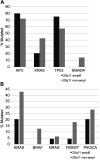Chromosome 20q11.21 Amplifications in Colorectal Cancer
- PMID: 33994370
- PMCID: PMC8240038
- DOI: 10.21873/cgp.20274
Chromosome 20q11.21 Amplifications in Colorectal Cancer
Abstract
Background: Colorectal cancer is the most common gastrointestinal carcinoma in western countries. Prognosis of metastatic colorectal cancer has improved in the last decades, but the disease continues to carry an adverse outcome in most cases. An improved understanding of molecular pathogenesis has provided incremental benefits in survival outcomes with the introduction of targeted therapies for specific sub-types and gives hope for further improvements.
Materials and methods: Publicly available data from genomic series of colorectal cancer published by the TCGA were analyzed with the aim of characterizing the sub-set of colorectal cancers carrying amplifications of chromosome 20q11.21, compared with cancers with no amplifications in this locus. Associations of 20q11.21-amplified cancers with other molecular lesions commonly observed in colorectal cancer were explored. mRNA expression of genes from the locus in amplified cases was analyzed. An exploratory survival analysis was also performed.
Results: Amplifications of genes at chromosome arm 20q are observed in 7% to 9% of colorectal cancers, representing the most commonly amplified loci in this type of cancer. The 20q11.21 presents the highest amplification rate in the 20q arm. 20q11.21 amplified cancers display concomitant mutations in the KRAS pathway and SMAD4 less often than non-amplified cancers. Mutations in DNA repair genes are also less often encountered in 20q11.21 amplified colorectal cancers than non-amplified ones.
Conclusion: Amplification of genes at locus 20q11.21, representing the most frequently amplified locus in colorectal cancers, is associated with specific molecular characteristics and may have therapeutic implications.
Keywords: Colorectal cancer; amplifications; chromosomal instability; copy number alterations; mutations.
Copyright© 2021, International Institute of Anticancer Research (Dr. George J. Delinasios), All rights reserved.
Conflict of interest statement
None to be declared.
Figures







Similar articles
-
Cell Models for Chromosome 20q11.21 Amplification and Drug Sensitivities in Colorectal Cancer.Medicina (Kaunas). 2021 Aug 24;57(9):860. doi: 10.3390/medicina57090860. Medicina (Kaunas). 2021. PMID: 34577783 Free PMC article.
-
Chromosome 20q Amplification Defines a Subtype of Microsatellite Stable, Left-Sided Colon Cancers with Wild-type RAS/RAF and Better Overall Survival.Mol Cancer Res. 2017 Jun;15(6):708-713. doi: 10.1158/1541-7786.MCR-16-0352. Epub 2017 Feb 9. Mol Cancer Res. 2017. PMID: 28184012 Free PMC article.
-
Chromosome arm 20q gains and other genomic alterations in colorectal cancer metastatic to liver, as analyzed by comparative genomic hybridization and fluorescence in situ hybridization.Genes Chromosomes Cancer. 1999 Jun;25(2):82-90. doi: 10.1002/(sici)1098-2264(199906)25:2<82::aid-gcc2>3.0.co;2-6. Genes Chromosomes Cancer. 1999. PMID: 10337990
-
Amplification of 8p11.23 in cancers and the role of amplicon genes.Life Sci. 2021 Jan 1;264:118729. doi: 10.1016/j.lfs.2020.118729. Epub 2020 Nov 6. Life Sci. 2021. PMID: 33166592 Review.
-
Molecular biology of colorectal cancer.Curr Probl Cancer. 1997 Sep-Oct;21(5):233-300. doi: 10.1016/s0147-0272(97)80003-7. Curr Probl Cancer. 1997. PMID: 9438104 Review.
Cited by
-
Gains of 20q11.21 in human pluripotent stem cells: Insights from cancer research.Stem Cell Reports. 2024 Jan 9;19(1):11-27. doi: 10.1016/j.stemcr.2023.11.013. Epub 2023 Dec 28. Stem Cell Reports. 2024. PMID: 38157850 Free PMC article. Review.
-
Clonal transcriptomics identifies mechanisms of chemoresistance and empowers rational design of combination therapies.Elife. 2022 Dec 16;11:e80981. doi: 10.7554/eLife.80981. Elife. 2022. PMID: 36525288 Free PMC article.
-
Gain of 1q confers an MDM4-driven growth advantage to undifferentiated and differentiating hESC while altering their differentiation capacity.Cell Death Dis. 2024 Nov 21;15(11):852. doi: 10.1038/s41419-024-07236-x. Cell Death Dis. 2024. PMID: 39572522 Free PMC article.
-
Cell Models for Chromosome 20q11.21 Amplification and Drug Sensitivities in Colorectal Cancer.Medicina (Kaunas). 2021 Aug 24;57(9):860. doi: 10.3390/medicina57090860. Medicina (Kaunas). 2021. PMID: 34577783 Free PMC article.
-
Measuring cancer driving force of chromosomal aberrations through multi-layer Boolean implication networks.PLoS One. 2024 Apr 9;19(4):e0301591. doi: 10.1371/journal.pone.0301591. eCollection 2024. PLoS One. 2024. PMID: 38593144 Free PMC article.
References
-
- Schlicker A, Beran G, Chresta CM, McWalter G, Pritchard A, Weston S, Runswick S, Davenport S, Heathcote K, Castro DA, Orphanides G, French T, Wessels LF. Subtypes of primary colorectal tumors correlate with response to targeted treatment in colorectal cell lines. BMC Med Genomics. 2012;5:66. doi: 10.1186/1755-8794-5-66. - DOI - PMC - PubMed
-
- Budinska E, Popovici V, Tejpar S, D’Ario G, Lapique N, Sikora KO, Di Narzo AF, Yan P, Hodgson JG, Weinrich S, Bosman F, Roth A, Delorenzi M. Gene expression patterns unveil a new level of molecular heterogeneity in colorectal cancer. J Pathol. 2013;231(1):63–76. doi: 10.1002/path.4212. - DOI - PMC - PubMed
-
- De Sousa E Melo F, Wang X, Jansen M, Fessler E, Trinh A, de Rooij LP, de Jong JH, de Boer OJ, van Leersum R, Bijlsma MF, Rodermond H, van der Heijden M, van Noesel CJ, Tuynman JB, Dekker E, Markowetz F, Medema JP, Vermeulen L. Poor-prognosis colon cancer is defined by a molecularly distinct subtype and develops from serrated precursor lesions. Nat Med. 2013;19(5):614–618. doi: 10.1038/nm.3174. - DOI - PubMed
MeSH terms
LinkOut - more resources
Full Text Sources
Other Literature Sources
Medical
Miscellaneous
